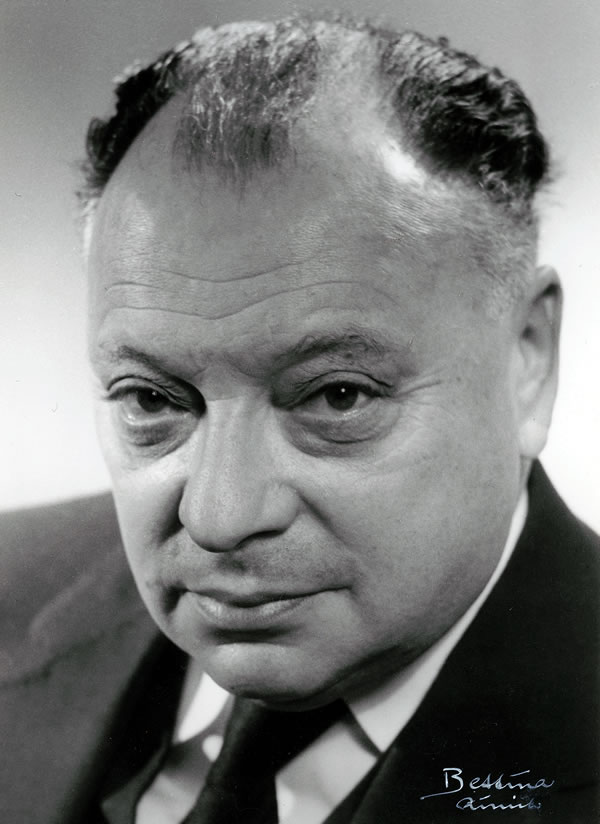Wolfgang Pauli (1900–1958)
Professor of theoretical physics

Wolfgang Pauli was born in Vienna on 25 April 1900 as the first child to Berta and Wolfgang Joseph Pauli. His mother was a journalist, his father a doctor and professor of chemistry. Pauli attended the humanist grammar school in the city, graduating in 1918. From the autumn of the same year, he studied physics in Munich, where he obtained a doctorate in 1921.
Time as assistance and discovery of the exclusion principle
In the winter semester of 1921/22 he was an assistant at the University of Göttingen and in the summer semester of 1922 at the University of Hamburg. At the invitation of Niels Bohr, this was followed by a spell at the university in Copenhagen in 1922/23. In 1924 Pauli completed his habilitation at the University of Hamburg and discovered the exclusion principle that was subsequently named after him, which he formulated in an article in the journal "Zeitschrift für Physik" in 1925. In November 1926 he was awarded the title of professor by the University of Hamburg.
The neutrino and private life
In early 1928 he took up a position at ETH Zurich's Institute of Theoretical Physics, collaborating with experimental physicist Paul Scherrer, who largely relieved him of his administrative duties as director of the institute. In a letter in late 1930, Pauli posited the existence of the neutrino. However, he only presented this hypothesis publicly in October 1933 at the 7th Solvay Congress in Brussels.
In December 1929 Pauli married the Berlin dancer Käthe Deppert, only to divorce her a year later. Pauli subsequently turned to psychiatrist and psychologist Car Gustav Jung, who referred him to a young colleague, Erna Rosenbaum, for treatment. In April 1934 Pauli married Franca Bertram.
Second World War and USA
After the annexation of Austria by Nazi Germany, Pauli's position was uncertain on account of his Jewish roots. Following the rejection of two applications for naturalisation in Zurich in 1938 and 1940, Pauli took a leave of absence from ETH Zurich and in 1940 accepted a guest professorship at Princeton University at the Institute of Advanced Studies in the USA. In 1945 he received the Nobel Prize for Physics for his discovery of the exclusion principle and was granted American citizenship in 1946. Despite a proposal to become Einstein's successor in Princeton and an offer of a professorship at Columbia University in New York, however, he returned to ETH Zurich in the spring of 1946. In 1949 he was granted Swiss citizenship.
Success and Fame
On the one hand, Pauli's renown drew many young physicists to Zurich in the years that followed; on the other hand, Pauli repeatedly took leaves of absence for numerous international engagements. At the same time, he supported the Physics Institute far more in administrative matters than before, without restricting his scientific activity. He also began dabbling in philosophical and psychological matters.
Pauli died in hospital in Zurich on 15 December 1958, only days after suffering a bout of pain in a lecture.
Manuscript
![Excerpt from Wolfgang Pauli's letter to Bartel Leendert van der Waerden: "Lieber Herr van der Waerden Ich komme eben von der Reise nach Mainz und Holland zurück. Mein Referat in Mainz war ein Erfolg, wofür ich auch Ihnen sehr zu danken habe. Dort lernte ich n.a. Herrm W. Hartner [...]"](/en/locations-and-media/platforms/short-portraits/pauli-wolfgang/_jcr_content/par/fullwidthimage/image.imageformat.1286.1621509510.jpg)
Holdings
Pauli's life and work is presented in detail in the virtual exhibition Wolfgang Pauli and Modern Physics.
The ETH Zurich University Archives hold ETH Zurich's historical administrative records, including numerous documents on Pauli. These are also available in print form: Wolfgang Pauli und sein Wirken an der ETH Zürich. Aus den Dienstakten der Eidgenössischen Technischen Hochschule, herausgegeben von Charles P. Enz, Beat Glaus, Gerhard Oberkofler, Zürich 1997.
In addition, the personal papers of various prominent figures also contain documents by Pauli, which are listed in an index. Pauli's own personal papers were donated to the external page CERN Archive by his widow.
All Nobel Prize laureates of ETH Zurich at a glance